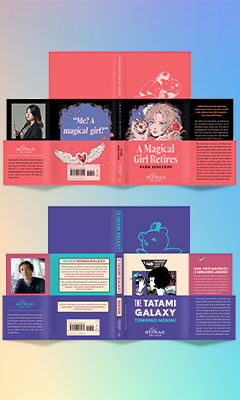New from Nomad Editions: Almond; A Magical Girl Retires; The Tatami Galaxy
by
While stories are a mainstay of human expression, their delivery has transformed from leatherbound, illuminated manuscripts with gilded edges to e-books accessed via mobile device. The new Nomad Editions format from HarperVia, launching in November, recognizes the power of a great story and the critical difference a change in format can make. With their pocket-sized trim size and appealing style, Nomad Editions are aimed at the highly mobile, highly discerning reader. The publisher's mission statement indicates this new format is "designed to travel and connect people across cultures and time."
The idea came from publisher Judith Curr, who has worked to acquire international titles and works in translation since launching HarperVia in 2019. The first three titles, all from HarperVia, in the Nomad Editions format are translated works that have found great success in the English-speaking world. Building on this existing interest, Nomad Editions come beautifully packaged; the paper is smooth and substantial, and the Sabon typeface is clear and easy to read. The page layouts, too, contribute to readability on-the-go, with ample white space to frame the text. Once you hold a Nomad Edition, you might find yourself thinking, "I could read this story digitally, but why would I want to?"
The inspiration for a popular anime series, The Tatami Galaxy by Tomihiko Morimi features a college student, unnamed but noted to be in his junior year. He is uncertain about his future and looks with some regret on his past, especially his odd friendship with the unpleasant Ozu. Emily Balistrieri's translation, shortlisted for the PEN Translation Prize, strikes a clever balance between sulky angst and wry humor. The longest of the three initial releases, The Tatami Galaxy is divided into four sections, each offering a different version of the path the narrator might take. While long passages of the story are repeated verbatim in each section, the way they are remixed and repackaged in each version will fascinate and amuse readers as they consider questions of fate and destiny and the importance small decisions, like which college club to join, can take on. Despite these diverging paths, some elements stay consistent, so maybe the creepy Ozu is right: "No matter what path you chose, you would have ended up here."
With its fantastical plot and illustrations, A Magical Girl Retires by Park Seolyeon is the closest to manga, and its slim size makes it the most portable--and the most adorable--of these editions. Taking inspiration from such iconic Magical Girls as Sailor Moon, this clever tale opens on an unnamed young woman who is contemplating suicide. With rising credit card debt, no job, and a sense that she doesn't matter, she despairs, asking, "Was I invisible? Had someone pressed the mute button on me?" Despite this dark start, levity abounds in this short novel, like when the young woman who stops her from jumping is dressed in a knee-length white dress, white shoes, and a white bow, and the protagonist's response is, "What the hell... angel cosplay?" As the story progresses, and she is recruited into the Trade Union for Magical Girls, the story manages to balance this dark urgency and light humor. It is a silly action adventure and a serious conversation about climate change and violence against women and accountability. As translator Anton Hur explains in a closing note: "Magical girls exist because justice does not."
Won-pyung Sohn's Almond is translated beautifully from the original Korean by Sandy Joosun Lee. It introduces Yunjae, a young man with alexithymia, defined in the opening notes as "the inability to identify and express one's feelings." Yunjae's condition doesn't fully become clear until age six, when he witnesses a brutal assault on a young boy. His emotionless response to such a traumatic event tells his mother that the differences she's been noticing might mean something more. Told in first-person from Yunjae's singular perspective, these events from the past are recounted fairly coldly, just as the events of his 16th birthday are.
That night, Yunjae's Mom and Granny are among those attacked by a knife-wielding man outside a restaurant. Yunjae sees it all through the door, intentionally blocked by his Granny, who dies from her injuries. Though the somewhat graphic depiction of this assault is hard to read, the clarity and direct tone reflect the boy's detached way of experiencing even the worst of the world: "Everyone just stood there and watched, as if the man and Mom and Granny were putting on a play. Everyone was the audience. Including me." With his safe world turned upside down, Yunjae must make his way alone, and the way he grows and learns how to navigate relationships is a beautiful exploration of the human experience. Yunjae may be unlike anyone else, but readers will recognize the universal truths he explores.
While anyone can appreciate these first three titles, this new format might find its clearest market in the New Adult, Gen-Z audience. Each of the three features a younger protagonist facing a transition in their life, a feeling of becoming that is familiar to young adults making their way into the world on their own. Plus, with the rise of popularity in manga, anime, and K-pop, these three tales will fit in seamlessly. --Sara Beth West
Almond by Won-pyung Sohn, trans. by Sandy Joosun Lee (HarperVia, $16.99 trade paper, 352p., 9780063469228, November 4, 2025)
A Magical Girl Retires by Park Seolyeon, trans. by Anton Hur (HarperVia, $16.99 trade paper, 192p., 9780063469242, November 4, 2025)
The Tatami Galaxy by Tomihiko Morimi, trans. by Emily Balistrieri (HarperVia, $17.99 trade paper, 560p., 9780063469235, November 4, 2025)







